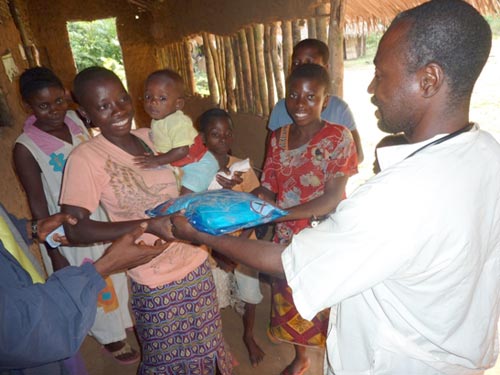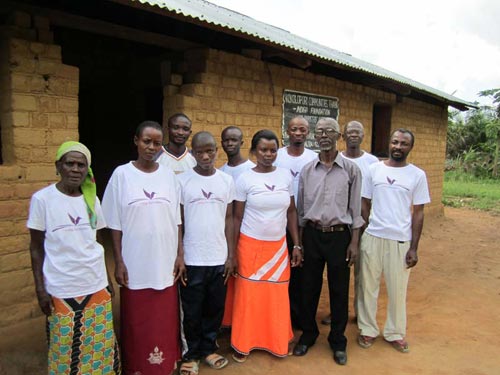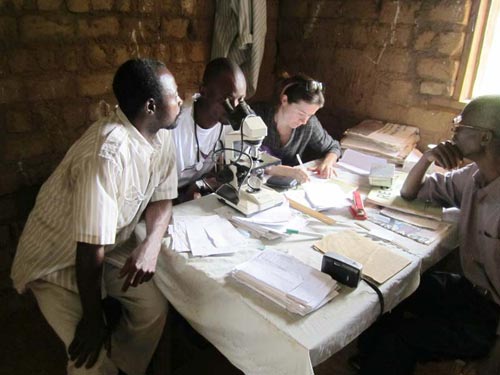2007 – 2012
After five years of partnership, and having contributed significantly to the health and development of the Kokolopori community, we’ve decided that the point has been reached where it’s feasible for the health clinic to be sustained through other avenues, and it’s appropriate for indigo foundation to bow out.
To all who have supported the Congo project, our sincere thanks
Project overview
The Bonobo Health Clinic operates in Kokolopori, in the Democratic Republic of Congo (DRC), which is situated deep in the heart of the Congo Basin rainforest. The focus of Phase 1 of the project (2007-2009) was: the prevention of malaria, particularly in mothers and children, through distribution of insecticide treated nets, with some education and malaria treatment; support of health and sanitation education; and the provision of nurses’ salaries, along with basic pharmaceuticals and medical supplies.
The main objectives of Phase 2 of the project (2010-2012) were to:
- Develop the Bonobo Health Clinic into a professionally run, government registered Centre de Sante.
- Improve community awareness of the causes of common illness and disease, as well as preventative measures generated through public health education on malaria, tropical diseases, sanitation & hygiene, reproductive health and nutrition.
- Strengthen the capacity of Vie Sauvage to successfully manage the health program.
Project successes (from Albert Lokasola’s last report):
- The clinic is now benefiting from a national program to combat Trypanosomiasis (sleeping sickness). The combined efforts of the project’s technical advisor, Veronique de Clerck, Ingrid Schulze (former director of KFCSCP) and the DRC team, resulted in the arrival of Medicines Sans Frontiers at Kokolopori to conduct a thorough survey. The results of this survey now qualify Kokolopori as one of the endemic zones of Trypanosomiasis in DRC. Subsequently, MSF has set up Trypanosomiasis testing procedures at the clinic and they also provided associated medicines and supplies (including four more beds and mattresses).
- The community who have relied mainly on traditional medicines and knowledge for treating malaria are now adopting preventive measures against the disease and use clinic medicines to combat it. Subsequently, there is a reduction in malaria, although there is still a long way to go in education, prevention and treatment before malaria loses its place as the community’s major ailment.
- Dr Saidi and his staff have mastered the drug stock management system introduced by Veronique which resulted in the stock lasting six months, instead of the usual three to four.
Challenges
 Our major focus is helping the clinic become a government registered Centre de Sante (basic health clinic) which has been a long and challenging process. Amistake in the handling of the clinic’s registration last year delayed the process further, along with a need for the clinic to be better equipped to meet the Ministry of Health’s ‘Centre de Sante’ standards.
Our major focus is helping the clinic become a government registered Centre de Sante (basic health clinic) which has been a long and challenging process. Amistake in the handling of the clinic’s registration last year delayed the process further, along with a need for the clinic to be better equipped to meet the Ministry of Health’s ‘Centre de Sante’ standards.
indigo foundation is in the midst of a sixth and final year of supporting the Bonobo Health clinic. The clinic has developed from nothing in 2007 to a point where it is now servicing members of the Kokolopori community for health problems including malaria, respiratory tract infections and gastro-intestinal diseases, as well as reproductive health needs.
The two greatest challenges at this time are:
- BCI’s quest to secure ongoing support for the clinic, preferably from a better-resourced, health-oriented support organization, before we withdraw, and
- Leaving behind a clinic with supplies, logistics and skills to continue its mission.
Key Data
Project Partner: Vie Sauvage and Bonobo Conservation Initiative
Partner since: 1997
Project team: Leanne Hankey, Emily Berry, Veronique de Clerk, Jessica Glover, Phil Strickland



